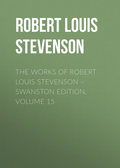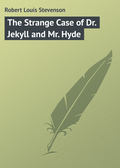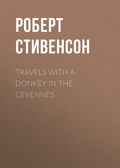
Роберт Льюис Стивенсон
Essays of Travel
IN THE SEASON
Close into the edge of the forest, so close that the trees of the bornage stand pleasantly about the last houses, sits a certain small and very quiet village. There is but one street, and that, not long ago, was a green lane, where the cattle browsed between the doorsteps. As you go up this street, drawing ever nearer the beginning of the wood, you will arrive at last before an inn where artists lodge. To the door (for I imagine it to be six o’clock on some fine summer’s even), half a dozen, or maybe half a score, of people have brought out chairs, and now sit sunning themselves, and waiting the omnibus from Melun. If you go on into the court you will find as many more, some in billiard-room over absinthe and a match of corks some without over a last cigar and a vermouth. The doves coo and flutter from the dovecot; Hortense is drawing water from the well; and as all the rooms open into the court, you can see the white-capped cook over the furnace in the kitchen, and some idle painter, who has stored his canvases and washed his brushes, jangling a waltz on the crazy, tongue-tied piano in the salle-à-manger. ‘Edmond, encore un vermouth,’ cries a man in velveteen, adding in a tone of apologetic afterthought, ‘un double, s’il vous plaît.’ ‘Where are you working?’ asks one in pure white linen from top to toe. ‘At the Carrefour de l’Épine,’ returns the other in corduroy (they are all gaitered, by the way). ‘I couldn’t do a thing to it. I ran out of white. Where were you?’ ‘I wasn’t working. I was looking for motives.’ Here is an outbreak of jubilation, and a lot of men clustering together about some new-comer with outstretched hands; perhaps the ‘correspondence’ has come in and brought So-and-so from Paris, or perhaps it is only So-and-so who has walked over from Chailly to dinner.
‘À table, Messieurs!’ cries M. Siron, bearing through the court the first tureen of soup. And immediately the company begins to settle down about the long tables in the dining-room, framed all round with sketches of all degrees of merit and demerit. There’s the big picture of the huntsman winding a horn with a dead boar between his legs, and his legs – well, his legs in stockings. And here is the little picture of a raw mutton-chop, in which Such-a-one knocked a hole last summer with no worse a missile than a plum from the dessert. And under all these works of art so much eating goes forward, so much drinking, so much jabbering in French and English, that it would do your heart good merely to peep and listen at the door. One man is telling how they all went last year to the fête at Fleury, and another how well so-and-so would sing of an evening: and here are a third and fourth making plans for the whole future of their lives; and there is a fifth imitating a conjurer and making faces on his clenched fist, surely of all arts the most difficult and admirable! A sixth has eaten his fill, lights a cigarette, and resigns himself to digestion. A seventh has just dropped in, and calls for soup. Number eight, meanwhile, has left the table, and is once more trampling the poor piano under powerful and uncertain fingers.
Dinner over, people drop outside to smoke and chat. Perhaps we go along to visit our friends at the other end of the village, where there is always a good welcome and a good talk, and perhaps some pickled oysters and white wine to close the evening. Or a dance is organised in the dining-room, and the piano exhibits all its paces under manful jockeying, to the light of three or four candles and a lamp or two, while the waltzers move to and fro upon the wooden floor, and sober men, who are not given to such light pleasures, get up on the table or the sideboard, and sit there looking on approvingly over a pipe and a tumbler of wine. Or sometimes – suppose my lady moon looks forth, and the court from out the half-lit dining-room seems nearly as bright as by day, and the light picks out the window-panes, and makes a clear shadow under every vine-leaf on the wall – sometimes a picnic is proposed, and a basket made ready, and a good procession formed in front of the hotel. The two trumpeters in honour go before; and as we file down the long alley, and up through devious footpaths among rocks and pine-trees, with every here and there a dark passage of shadow, and every here and there a spacious outlook over moonlit woods, these two precede us and sound many a jolly flourish as they walk. We gather ferns and dry boughs into the cavern, and soon a good blaze flutters the shadows of the old bandits’ haunt, and shows shapely beards and comely faces and toilettes ranged about the wall. The bowl is lit, and the punch is burnt and sent round in scalding thimblefuls. So a good hour or two may pass with song and jest. And then we go home in the moonlit morning, straggling a good deal among the birch tufts and the boulders, but ever called together again, as one of our leaders winds his horn. Perhaps some one of the party will not heed the summons, but chooses out some by-way of his own. As he follows the winding sandy road, he hears the flourishes grow fainter and fainter in the distance, and die finally out, and still walks on in the strange coolness and silence and between the crisp lights and shadows of the moonlit woods, until suddenly the bell rings out the hour from far-away Chailly, and he starts to find himself alone. No surf-bell on forlorn and perilous shores, no passing knell over the busy market-place, can speak with a more heavy and disconsolate tongue to human ears. Each stroke calls up a host of ghostly reverberations in his mind. And as he stands rooted, it has grown once more so utterly silent that it seems to him he might hear the church bells ring the hour out all the world over, not at Chailly only, but in Paris, and away in outlandish cities, and in the village on the river, where his childhood passed between the sun and flowers.
IDLE HOURS
The woods by night, in all their uncanny effect, are not rightly to be understood until you can compare them with the woods by day. The stillness of the medium, the floor of glittering sand, these trees that go streaming up like monstrous sea-weeds and waver in the moving winds like the weeds in submarine currents, all these set the mind working on the thought of what you may have seen off a foreland or over the side of a boat, and make you feel like a diver, down in the quiet water, fathoms below the tumbling, transitory surface of the sea. And yet in itself, as I say, the strangeness of these nocturnal solitudes is not to be felt fully without the sense of contrast. You must have risen in the morning and seen the woods as they are by day, kindled and coloured in the sun’s light; you must have felt the odour of innumerable trees at even, the unsparing heat along the forest roads, and the coolness of the groves.
And on the first morning you will doubtless rise betimes. If you have not been wakened before by the visit of some adventurous pigeon, you will be wakened as soon as the sun can reach your window – for there are no blind or shutters to keep him out – and the room, with its bare wood floor and bare whitewashed walls, shines all round you in a sort of glory of reflected lights. You may doze a while longer by snatches, or lie awake to study the charcoal men and dogs and horses with which former occupants have defiled the partitions: Thiers, with wily profile; local celebrities, pipe in hand; or, maybe, a romantic landscape splashed in oil. Meanwhile artist after artist drops into the salle-à-manger for coffee, and then shoulders easel, sunshade, stool, and paint-box, bound into a fagot, and sets of for what he calls his ‘motive.’ And artist after artist, as he goes out of the village, carries with him a little following of dogs. For the dogs, who belong only nominally to any special master, hang about the gate of the forest all day long, and whenever any one goes by who hits their fancy, profit by his escort, and go forth with him to play an hour or two at hunting. They would like to be under the trees all day. But they cannot go alone. They require a pretext. And so they take the passing artist as an excuse to go into the woods, as they might take a walking-stick as an excuse to bathe. With quick ears, long spines, and bandy legs, or perhaps as tall as a greyhound and with a bulldog’s head, this company of mongrels will trot by your side all day and come home with you at night, still showing white teeth and wagging stunted tail. Their good humour is not to be exhausted. You may pelt them with stones if you please, and all they will do is to give you a wider berth. If once they come out with you, to you they will remain faithful, and with you return; although if you meet them next morning in the street, it is as like as not they will cut you with a countenance of brass.
The forest – a strange thing for an Englishman – is very destitute of birds. This is no country where every patch of wood among the meadows gibes up an increase of song, and every valley wandered through by a streamlet rings and reverberates from side to with a profusion of clear notes. And this rarity of birds is not to be regretted on its own account only. For the insects prosper in their absence, and become as one of the plagues of Egypt. Ants swarm in the hot sand; mosquitos drone their nasal drone; wherever the sun finds a hole in the roof of the forest, you see a myriad transparent creatures coming and going in the shaft of light; and even between-whiles, even where there is no incursion of sun-rays into the dark arcade of the wood, you are conscious of a continual drift of insects, an ebb and flow of infinitesimal living things between the trees. Nor are insects the only evil creatures that haunt the forest. For you may plump into a cave among the rocks, and find yourself face to face with a wild boar, or see a crooked viper slither across the road.
Perhaps you may set yourself down in the bay between two spreading beech-roots with a book on your lap, and be awakened all of a sudden by a friend: ‘I say, just keep where you are, will you? You make the jolliest motive.’ And you reply: ‘Well, I don’t mind, if I may smoke.’ And thereafter the hours go idly by. Your friend at the easel labours doggedly a little way off, in the wide shadow of the tree; and yet farther, across a strait of glaring sunshine, you see another painter, encamped in the shadow of another tree, and up to his waist in the fern. You cannot watch your own effigy growing out of the white trunk, and the trunk beginning to stand forth from the rest of the wood, and the whole picture getting dappled over with the flecks of sun that slip through the leaves overhead, and, as a wind goes by and sets the trees a-talking, flicker hither and thither like butterflies of light. But you know it is going forward; and, out of emulation with the painter, get ready your own palette, and lay out the colour for a woodland scene in words.
Your tree stands in a hollow paved with fern and heather, set in a basin of low hills, and scattered over with rocks and junipers. All the open is steeped in pitiless sunlight. Everything stands out as though it were cut in cardboard, every colour is strained into its highest key. The boulders are some of them upright and dead like monolithic castles, some of them prone like sleeping cattle. The junipers – looking, in their soiled and ragged mourning, like some funeral procession that has gone seeking the place of sepulchre three hundred years and more in wind and rain – are daubed in forcibly against the glowing ferns and heather. Every tassel of their rusty foliage is defined with pre-Raphaelite minuteness. And a sorry figure they make out there in the sun, like misbegotten yew-trees! The scene is all pitched in a key of colour so peculiar, and lit up with such a discharge of violent sunlight, as a man might live fifty years in England and not see.
Meanwhile at your elbow some one tunes up a song, words of Ronsard to a pathetic tremulous air, of how the poet loved his mistress long ago, and pressed on her the flight of time, and told her how white and quiet the dead lay under the stones, and how the boat dipped and pitched as the shades embarked for the passionless land. Yet a little while, sang the poet, and there shall be no more love; only to sit and remember loves that might have been. There is a falling flourish in the air that remains in the memory and comes back in incongruous places, on the seat of hansoms or in the warm bed at night, with something of a forest savour.
‘You can get up now,’ says the painter; ‘I’m at the background.’
And so up you get, stretching yourself, and go your way into the wood, the daylight becoming richer and more golden, and the shadows stretching farther into the open. A cool air comes along the highways, and the scents awaken. The fir-trees breathe abroad their ozone. Out of unknown thickets comes forth the soft, secret, aromatic odour of the woods, not like a smell of the free heaven, but as though court ladies, who had known these paths in ages long gone by, still walked in the summer evenings, and shed from their brocades a breath of musk or bergamot upon the woodland winds. One side of the long avenues is still kindled with the sun, the other is plunged in transparent shadow. Over the trees the west begins to burn like a furnace; and the painters gather up their chattels, and go down, by avenue or footpath, to the plain.
A PLEASURE-PARTY
As this excursion is a matter of some length, and, moreover, we go in force, we have set aside our usual vehicle, the pony-cart, and ordered a large wagonette from Lejosne’s. It has been waiting for near an hour, while one went to pack a knapsack, and t’other hurried over his toilette and coffee; but now it is filled from end to end with merry folk in summer attire, the coachman cracks his whip, and amid much applause from round the inn door off we rattle at a spanking trot. The way lies through the forest, up hill and down dale, and by beech and pine wood, in the cheerful morning sunshine. The English get down at all the ascents and walk on ahead for exercise; the French are mightily entertained at this, and keep coyly underneath the tilt. As we go we carry with us a pleasant noise of laughter and light speech, and some one will be always breaking out into a bar or two of opera bouffe. Before we get to the Route Ronde here comes Desprez, the colourman from Fontainebleau, trudging across on his weekly peddle with a case of merchandise; and it is ‘Desprez, leave me some malachite green’; ‘Desprez, leave me so much canvas’; ‘Desprez, leave me this, or leave me that’; M. Desprez standing the while in the sunlight with grave face and many salutations. The next interruption is more important. For some time back we have had the sound of cannon in our ears; and now, a little past Franchard, we find a mounted trooper holding a led horse, who brings the wagonette to a stand. The artillery is practising in the Quadrilateral, it appears; passage along the Route Ronde formally interdicted for the moment. There is nothing for it but to draw up at the glaring cross-roads and get down to make fun with the notorious Cocardon, the most ungainly and ill-bred dog of all the ungainly and ill-bred dogs of Barbizon, or clamber about the sandy banks. And meanwhile the doctor, with sun umbrella, wide Panama, and patriarchal beard, is busy wheedling and (for aught the rest of us know) bribing the too facile sentry. His speech is smooth and dulcet, his manner dignified and insinuating. It is not for nothing that the Doctor has voyaged all the world over, and speaks all languages from French to Patagonian. He has not come borne from perilous journeys to be thwarted by a corporal of horse. And so we soon see the soldier’s mouth relax, and his shoulders imitate a relenting heart. ‘En voiture, Messieurs, Mesdames,’ sings the Doctor; and on we go again at a good round pace, for black care follows hard after us, and discretion prevails not a little over valour in some timorous spirits of the party. At any moment we may meet the sergeant, who will send us back. At any moment we may encounter a flying shell, which will send us somewhere farther off than Grez.
Grez – for that is our destination – has been highly recommended for its beauty. ‘Il y a de l’eau,’ people have said, with an emphasis, as if that settled the question, which, for a French mind, I am rather led to think it does. And Grez, when we get there, is indeed a place worthy of some praise. It lies out of the forest, a cluster of houses, with an old bridge, an old castle in ruin, and a quaint old church. The inn garden descends in terraces to the river; stable-yard, kailyard, orchard, and a space of lawn, fringed with rushes and embellished with a green arbour. On the opposite bank there is a reach of English-looking plain, set thickly with willows and poplars. And between the two lies the river, clear and deep, and full of reeds and floating lilies. Water-plants cluster about the starlings of the long low bridge, and stand half-way up upon the piers in green luxuriance. They catch the dipped oar with long antennæ, and chequer the slimy bottom with the shadow of their leaves. And the river wanders and thither hither among the islets, and is smothered and broken up by the reeds, like an old building in the lithe, hardy arms of the climbing ivy. You may watch the box where the good man of the inn keeps fish alive for his kitchen, one oily ripple following another over the top of the yellow deal. And you can hear a splashing and a prattle of voices from the shed under the old kirk, where the village women wash and wash all day among the fish and water-lilies. It seems as if linen washed there should be specially cool and sweet.
We have come here for the river. And no sooner have we all bathed than we board the two shallops and push off gaily, and go gliding under the trees and gathering a great treasure of water-lilies. Some one sings; some trail their hands in the cool water; some lean over the gunwale to see the image of the tall poplars far below, and the shadow of the boat, with the balanced oars and their own head protruded, glide smoothly over the yellow floor of the stream. At last, the day declining – all silent and happy, and up to the knees in the wet lilies – we punt slowly back again to the landing-place beside the bridge. There is a wish for solitude on all. One hides himself in the arbour with a cigarette; another goes a walk in the country with Cocardon; a third inspects the church. And it is not till dinner is on the table, and the inn’s best wine goes round from glass to glass, that we begin to throw off the restraint and fuse once more into a jolly fellowship.
Half the party are to return to-night with the wagonette; and some of the others, loath to break up company, will go with them a bit of the way and drink a stirrup-cup at Marlotte. It is dark in the wagonette, and not so merry as it might have been. The coachman loses the road. So-and-so tries to light fireworks with the most indifferent success. Some sing, but the rest are too weary to applaud; and it seems as if the festival were fairly at an end —
‘Nous avons fait la noce,
Rentrons à nos foyers!’
And such is the burthen, even after we have come to Marlotte and taken our places in the court at Mother Antonine’s. There is punch on the long table out in the open air, where the guests dine in summer weather. The candles flare in the night wind, and the faces round the punch are lit up, with shifting emphasis, against a background of complete and solid darkness. It is all picturesque enough; but the fact is, we are aweary. We yawn; we are out of the vein; we have made the wedding, as the song says, and now, for pleasure’s sake, let’s make an end on’t. When here comes striding into the court, booted to mid-thigh, spurred and splashed, in a jacket of green cord, the great, famous, and redoubtable Blank; and in a moment the fire kindles again, and the night is witness of our laughter as he imitates Spaniards, Germans, Englishmen, picture-dealers, all eccentric ways of speaking and thinking, with a possession, a fury, a strain of mind and voice, that would rather suggest a nervous crisis than a desire to please. We are as merry as ever when the trap sets forth again, and say farewell noisily to all the good folk going farther. Then, as we are far enough from thoughts of sleep, we visit Blank in his quaint house, and sit an hour or so in a great tapestried chamber, laid with furs, littered with sleeping hounds, and lit up, in fantastic shadow and shine, by a wood fire in a mediæval chimney. And then we plod back through the darkness to the inn beside the river.
How quick bright things come to confusion! When we arise next morning, the grey showers fall steadily, the trees hang limp, and the face of the stream is spoiled with dimpling raindrops. Yesterday’s lilies encumber the garden walk, or begin, dismally enough, their voyage towards the Seine and the salt sea. A sickly shimmer lies upon the dripping house-roofs, and all the colour is washed out of the green and golden landscape of last night, as though an envious man had taken a water-colour sketch and blotted it together with a sponge. We go out a-walking in the wet roads. But the roads about Grez have a trick of their own. They go on for a while among clumps of willows and patches of vine, and then, suddenly and without any warning, cease and determine in some miry hollow or upon some bald knowe; and you have a short period of hope, then right-about face, and back the way you came! So we draw about the kitchen fire and play a round game of cards for ha’pence, or go to the billiard-room, for a match at corks and by one consent a messenger is sent over for the wagonette – Grez shall be left to-morrow.
To-morrow dawns so fair that two of the party agree to walk back for exercise, and let their kidnap-sacks follow by the trap. I need hardly say they are neither of them French; for, of all English phrases, the phrase ‘for exercise’ is the least comprehensible across the Straits of Dover. All goes well for a while with the pedestrians. The wet woods are full of scents in the noontide. At a certain cross, where there is a guardhouse, they make a halt, for the forester’s wife is the daughter of their good host at Barbizon. And so there they are hospitably received by the comely woman, with one child in her arms and another prattling and tottering at her gown, and drink some syrup of quince in the back parlour, with a map of the forest on the wall, and some prints of love-affairs and the great Napoleon hunting. As they draw near the Quadrilateral, and hear once more the report of the big guns, they take a by-road to avoid the sentries, and go on a while somewhat vaguely, with the sound of the cannon in their ears and the rain beginning to fall. The ways grow wider and sandier; here and there there are real sand-hills, as though by the sea-shore; the fir-wood is open and grows in clumps upon the hillocks, and the race of sign-posts is no more. One begins to look at the other doubtfully. ‘I am sure we should keep more to the right,’ says one; and the other is just as certain they should hold to the left. And now, suddenly, the heavens open, and the rain falls ‘sheer and strong and loud,’ as out of a shower-bath. In a moment they are as wet as shipwrecked sailors. They cannot see out of their eyes for the drift, and the water churns and gurgles in their boots. They leave the track and try across country with a gambler’s desperation, for it seems as if it were impossible to make the situation worse; and, for the next hour, go scrambling from boulder to boulder, or plod along paths that are now no more than rivulets, and across waste clearings where the scattered shells and broken fir-trees tell all too plainly of the cannon in the distance. And meantime the cannon grumble out responses to the grumbling thunder. There is such a mixture of melodrama and sheer discomfort about all this, it is at once so grey and so lurid, that it is far more agreeable to read and write about by the chimney-corner than to suffer in the person. At last they chance on the right path, and make Franchard in the early evening, the sorriest pair of wanderers that ever welcomed English ale. Thence, by the Bois d’Hyver, the Ventes-Alexandre, and the Pins Brulés, to the clean hostelry, dry clothes, and dinner.







